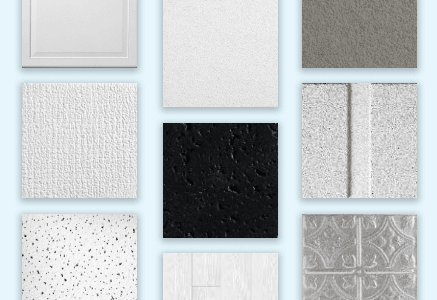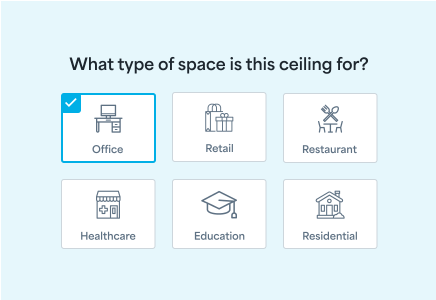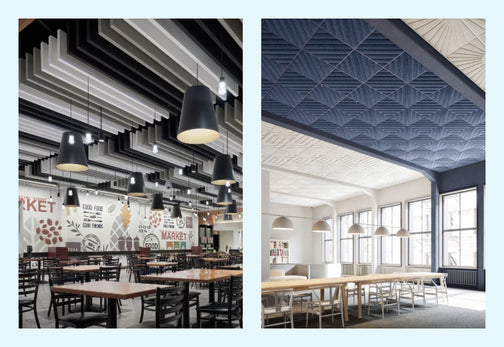Note that all manufacturers’ requirements must be met. Both lighting and ceiling components are designed with certain circumstances in mind; these conditions must be compatible. For example, never use incandescent lights in fire-rated applications. Incandescent lights, even in reflective, high hat, or can fixtures, are too hot for plastic surfaced panels, such as fiberglass. Be sure to follow fixture manufacturer recommendations along with the Kanopi by Armstrong Ceiling tips below for a successful installation.
How to install lighting in your ceiling
Install hanging 2’x4’ lighting
Install recessed lighting: tile ceiling
Install recessed lighting: suspended ceiling
Install recessed lighting: plank ceiling
Install surface-mount lighting
Install hanging 2’ x 4’ lighting
• To fully support your fixture, you’ll want to add hanger wires to each corner of the 2' x 4' drop-in light when installing in a suspended ceiling.
• If your fixture is heavy, place additional wires near the support for the fixture or independently support the fixture.
• The image above illustrates where you would normally have hanger wires and where additional ones should be placed.
Install recessed lighting: tile ceiling
• When installing a recessed light in a tile ceiling, make sure to use support bars.
• Support bars fit between the joists and hold up the light fixture so it doesn’t rest on the back of the tile.
• Mount the support bars so the face of the fixture is flush with the face of the tile as shown above.
Install recessed lighting: suspended ceiling
• Because recessed lights are usually smaller than grid openings, fixtures should be installed on a subframe.
• Use extra hanger wires to support the components at the subframe attachment points as outlined in the image above.
• Use fixtures with support bars that will rest on the grid. An alternative is to install the fixture independently from the grid.
• Cut an appropriate fixture opening in the panel and finish with a trim ring or grille.
Install recessed lighting: plank ceiling
Note that recessed lighting in a plank ceiling is outlined below using the EASY UP Installation System, however, you can use a similar method for COUNTRY CLASSIC Planks with adhesive, WOODHAVEN Planks with the included clips and screws, and WOODHAVEN Planks over an existing grid.
• Armstrong planks are a progressive installation, they start on one side and build off the already installed planks.
• Once you reach a row that will intersect with a light fixture, measure from the edge of the last row of installed planks to the center of the fixture.
• Transfer that mark to a plank resting on a hard surface and use a compass or the fixture trim ring to create the circle mark. Leave a quarter-inch gap for natural expansion of the planks.
• Install your plank making sure it aligns with the fixture opening and continue installing and cutting openings until the ceiling is finished.
• Lower the fixture housing so it is flush with the face of the installed planks.
Install surface-mount lighting
• When you install a surface-mounted light under a tile ceiling, you must secure the light to the joists or furring strips using screws that will allow at least 1" of the threaded portion of the screw to penetrate the wood.
• With incandescent lighting, use the correct wattage lamps as indicated by the manufacturer. If the light is fluorescent, leave a space between the back of the light and the face of the tile ceiling to allow air to circulate. When fixtures are installed against the face of the tile without the air space, the ballast may overheat and “burn out” more frequently.
Additional Resources
Visit Kanopi’s video library for more installation videos or check out our other how-to guides.



 Thanks for subscribing!
Thanks for subscribing!

